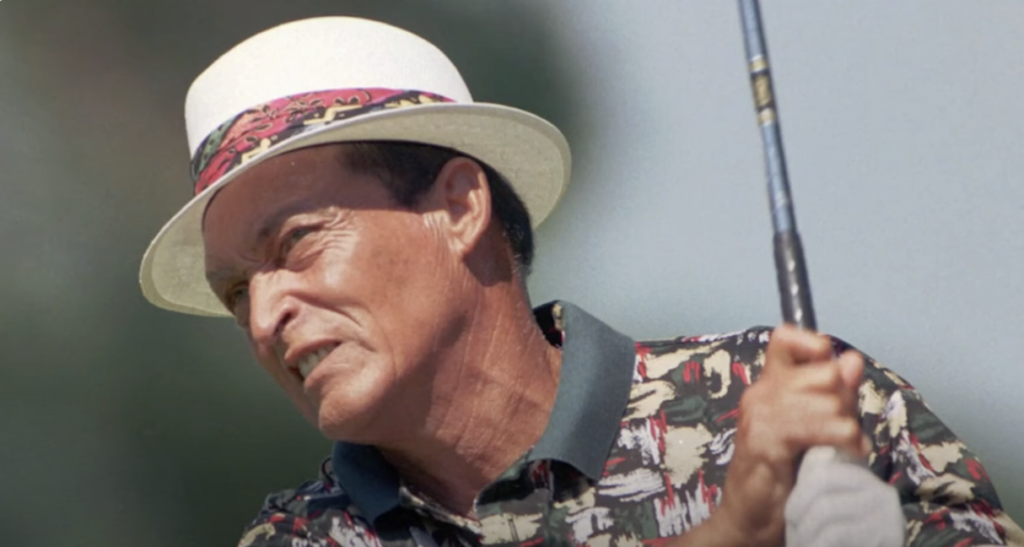
Juan “Chi Chi” Rodriguez, a Hall of Fame golfer known for his entertaining flair on the course and his inspiring life story, passed away in Clearwater, Florida, on Thursday, August 8, at the age of 88.
Rodriguez’s death was announced by Carmelo Javier Roost, a senator from his native Puerto Rico. While no cause of death was provided, Rodriguez had a history of heart issues. In October 1998, he was hospitalized after experiencing chest pains. Although initially reluctant to seek medical attention, Rodriguez later recounted in a 1999 interview with The Associated Press that he was told he had suffered a heart attack.
“It scared me for the first time,” Rodriguez said, recalling how his pilot, Jim Anderson, rushed him to the hospital where a team of doctors was ready to operate. “If I had waited another 10 minutes, the doctor said I would have needed a heart transplant.” Rodriguez survived what is often referred to as the “widow-maker” heart attack, which is fatal for about 50% of those who experience it. “So I beat the odds pretty good,” he reflected at the time.
Following his recovery, Rodriguez returned to professional golf for a few more years before gradually stepping away from competition. He then focused more on his philanthropic efforts, particularly the Chi Chi Rodriguez Youth Foundation, which he founded in 1979 in Clearwater, Florida. The foundation is dedicated to helping at-risk youth achieve academic, social, and economic success, embodying Rodriguez’s lifelong commitment to giving back to the community.
World Golf Hall of Fame member Juan “Chi Chi” Rodriguez was a remarkable figure both on and off the golf course. Known for his vibrant personality and signature “sword dance,” Rodriguez captivated audiences with his unique flair. His showmanship was matched by his philanthropy, as he devoted much of his life to helping at-risk youth through his Chi Chi Rodriguez Youth Foundation in Clearwater, Florida. This commitment to giving back was as integral to his legacy as his 30 career victories on the PGA TOUR and PGA TOUR Champions.
Born into humble beginnings in Rio Piedras, Puerto Rico, Rodriguez’s journey to becoming the greatest golfer his country ever produced was anything but easy. His father, a sugar cane cutter, earned just $18 a week, and by age seven, Rodriguez joined him in labor, working as a water carrier. His early years were marked by severe health challenges, including nearly dying from rickets and tropical sprue at age four. Yet, it was during these formative years that Rodriguez discovered the game of golf, a sport that would change his life forever.
Rodriguez’s introduction to golf was unconventional. After noticing that caddies were earning more money than he was on the plantation, he decided to become one himself. He fashioned a makeshift golf club from a guava tree branch and used hammered tin cans as balls. With no formal instruction, Rodriguez taught himself the game by observing others. His natural talent soon became evident, and after a two-year stint in the Army, he turned professional in 1960.
Rodriguez’s early years on the PGA TOUR were challenging, with middling success and no wins in his first three years. However, he broke through in 1963 with a victory at the Denver Open Invitational. This was followed by a pair of wins in 1964, including a memorable playoff triumph over Don January at the Lucky International Open and a narrow victory over Arnold Palmer at the Western Open. Despite these successes, Rodriguez’s career was hampered by health issues related to his childhood illnesses, which left his bones fragile and susceptible to injury. These challenges culminated in surgery in 1970, after which he lost his exempt status on the TOUR.
However, Rodriguez’s career took a significant turn in the 1970s when he refocused his efforts on the game. In 1972, he had his most successful financial year, finishing in the top 10 nine times and winning the Byron Nelson Golf Classic in a playoff against Billy Casper. His success continued with a win at the Greater Greensboro Open in 1973 and a selection to the U.S. Ryder Cup team. His final PGA TOUR victory came in 1979 at the Tallahassee Open.
Rodriguez’s career experienced a renaissance on the PGA TOUR Champions, where he won 22 times between 1986 and 1993. He set several records, including being the first player to win the same event three consecutive years and holding the record for the most consecutive birdies in a single tournament. His Champions Tour tenure included major victories at the Senior Tournament Players Championship in 1986 and the General Foods PGA Seniors’ Championship in 1987.
Beyond his golfing achievements, Rodriguez’s true legacy lies in his humanitarian efforts. His Youth Foundation annually supports 600 children from low-income families, providing them with opportunities to develop responsibility and work ethic. His philanthropic contributions were recognized with the USGA’s Bob Jones Award in 1989 and his induction into the World Humanitarian Sports Hall of Fame in 1994.
Chi Chi Rodriguez’s life story is a testament to perseverance, passion, and giving back. From the branches of a guava tree to the roots of his foundation, he achieved his goals and left an indelible mark on the world of golf and beyond. As he once said, “In life, you have to have goals, and I have conquered most of my goals. I didn’t become the greatest golfer in the world, but I became the greatest Puerto Rican golfer.”

